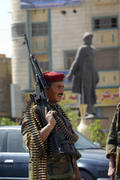“The most important fact about the recent operations has escaped most observers, however. The government of Iraq, that group of “Persian ex-pats” as many Iraqis and some Americans call them, went to war against the illegal Shia militias which are thoroughly infiltrated, supported, advised, trained, and led by Iran and its agents. When it ran into trouble, the government called for American support and then began to engage with its own local tribesmen, who eagerly volunteered to support the fight against the foreigners.  The consequences of the fighting in Basra and the subsequent cease-fire are still unclear. Some see events as testifying to Sadr’s strength, others point out that it was him who was forced to sue for peace.
The consequences of the fighting in Basra and the subsequent cease-fire are still unclear. Some see events as testifying to Sadr’s strength, others point out that it was him who was forced to sue for peace.
Kimberly and Fred Kagan, key advocates of the surge, have a piece in this week’s Weekly Standard which acknowledges the uncertainty over what happened in Basra—an uncertainty, which as they point out, largely exists because of the British decision to abandon the city—but argues that most coverage is missing the most crucial fact about what went on:
Iraq has already demonstrated that it is by far the most serious and determined ally the United States has in the war against al Qaeda by deploying more forces and taking more casualties in that struggle than any other state. After several years in which Americans feared that the Shia government would attempt to triangulate between Iran and the United States without taking sides, the Iraqi leadership has made its choice clear. It chose America.” We will probably learn more about what happened in Basra next week when General Petraeus testifies to Congress. But it does seem that the Iraqi government forces achieved more than it initially appeared they did.







Comments